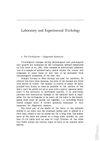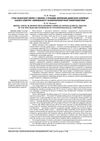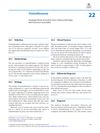 16 citations,
October 2023 in “Molecular cancer”
16 citations,
October 2023 in “Molecular cancer” New treatments like nanotechnology show promise in improving skin cancer therapy.
 April 1978 in “Pediatric research”
April 1978 in “Pediatric research” Patients with anorexia nervosa did not show a correlation between zinc levels and taste perception or the severity of their condition.
 19 citations,
September 1995 in “Food and nutrition bulletin”
19 citations,
September 1995 in “Food and nutrition bulletin” Leucaena leucocephala is nutritious but needs careful processing to remove toxins.
 60 citations,
October 2005 in “Experimental Dermatology”
60 citations,
October 2005 in “Experimental Dermatology” Zinc can both inhibit and stimulate mouse hair growth, and might help recover hair after chemotherapy.
 1 citations,
April 2015 in “Current problems in dermatology”
1 citations,
April 2015 in “Current problems in dermatology” The document concludes that the trichogram is a useful tool for diagnosing hair loss and suggests semi-organ cultures for practical trichological research.
 September 2004 in “Experimental dermatology”
September 2004 in “Experimental dermatology” Melatonin directly affects mouse hair follicles and may influence hair growth.
 13 citations,
March 2013 in “International Journal of Cosmetic Science”
13 citations,
March 2013 in “International Journal of Cosmetic Science” AcSDKP may help prevent skin and hair aging and promote their growth.
 57 citations,
September 2017 in “Journal of controlled release”
57 citations,
September 2017 in “Journal of controlled release” Nanocarrier-loaded gels improve drug delivery for cancer, skin conditions, and hair loss.
 April 2024 in “Materials today bio”
April 2024 in “Materials today bio” The CuCS/Cur wound dressing helps regenerate nerves and heal deep skin burns by rebuilding hair follicles.
 March 2024 in “Ukraïnsʹkij vìsnik psihonevrologìï”
March 2024 in “Ukraïnsʹkij vìsnik psihonevrologìï” Women with mixed alopecia have more severe mental health issues than those with metabolic alopecia.
 November 2022 in “Skin health and disease”
November 2022 in “Skin health and disease” People with hair loss conditions often have more mental health issues like depression and anxiety compared to those without hair loss.
 5 citations,
November 2021 in “Skin appendage disorders”
5 citations,
November 2021 in “Skin appendage disorders” Hair loss can cause stress and mental health issues, so treatments should address both the physical and psychological aspects, involving a team of dermatologists, psychologists, and hair specialists.
 1 citations,
October 2022 in “Adolescent Health, Medicine and Therapeutics”
1 citations,
October 2022 in “Adolescent Health, Medicine and Therapeutics” Gender-affirming therapy can cause skin issues like acne and hair loss in transgender adolescents, and more research is needed on its dermatological effects.
 46 citations,
August 2019 in “Journal of the European Academy of Dermatology and Venereology”
46 citations,
August 2019 in “Journal of the European Academy of Dermatology and Venereology” People with hair loss conditions experience more anxiety, depression, and a lower quality of life than those without these conditions.
 December 2023 in “Research Square (Research Square)”
December 2023 in “Research Square (Research Square)” People with Down syndrome have higher rates of certain immune-related conditions and need special medical attention.
 3 citations,
June 2023 in “Medicines”
3 citations,
June 2023 in “Medicines” Some antiseizure medications can cause reversible hair loss, with valproate, lamotrigine, and carbamazepine being the most common.
3 citations,
April 2020 in “Medicine” Acupuncture may be a safe and cost-effective treatment for Seborrheic alopecia.
 63 citations,
March 2000 in “Annals of clinical psychiatry”
63 citations,
March 2000 in “Annals of clinical psychiatry” Some psychiatric medications can cause hair loss, but it usually grows back after adjusting the medication.
11 citations,
January 2018 in “International journal of trichology” Valproate can cause hair loss and changes in hair appearance, but may help regrow hair when applied topically.
1 citations,
January 2022 in “Dermatology Research and Practice” Androgenetic alopecia negatively affects self-esteem and daily stress, especially in young men.
 20 citations,
February 2022 in “British Journal of Dermatology”
20 citations,
February 2022 in “British Journal of Dermatology” People with alopecia areata have a higher risk of depression and anxiety, and often face unemployment and work absences.
 11 citations,
November 2021 in “BMJ Open”
11 citations,
November 2021 in “BMJ Open” People with alopecia areata have higher rates of mental health issues, autoimmune diseases, and infections.
 17 citations,
May 2016 in “Journal of Psychosomatic Research”
17 citations,
May 2016 in “Journal of Psychosomatic Research” Illness perception affects mental health and quality of life in Chinese alopecia patients.
 144 citations,
July 2015 in “Clinical, Cosmetic and Investigational Dermatology”
144 citations,
July 2015 in “Clinical, Cosmetic and Investigational Dermatology” Alopecia areata is a common autoimmune disease affecting about 2% of people, causing significant disability and often associated with mental health issues and other autoimmune conditions.
 44 citations,
December 2010 in “Journal of Investigative Dermatology”
44 citations,
December 2010 in “Journal of Investigative Dermatology” Alopecia areata seriously lowers quality of life, especially affecting self-image, mental health, and social life.
 February 2024 in “The Open dermatology journal”
February 2024 in “The Open dermatology journal” Alopecia Areata affects people of all ages worldwide, is likely caused by genetic and environmental factors, and can lead to stress and depression, highlighting the need for treatments that address both physical and mental health.
 January 2018 in “Springer eBooks”
January 2018 in “Springer eBooks” Trichotillomania is a condition where people repeatedly pull out their hair, which can be triggered by stress and has various physical signs.
 20 citations,
December 2013 in “Clinical and Experimental Dermatology”
20 citations,
December 2013 in “Clinical and Experimental Dermatology” Smoking and drinking worsened hair loss in men with genetic hair loss, while eating and sleeping habits didn't; genetics played a bigger role than environment in hair loss.
 15 citations,
April 2003 in “Journal of dermatology”
15 citations,
April 2003 in “Journal of dermatology” Alopecia areata causes hair loss due to an immune attack on hair follicles, influenced by genetics and environment.
 4 citations,
January 2019 in “Clinical and Experimental Dermatology”
4 citations,
January 2019 in “Clinical and Experimental Dermatology” The review found that individualized treatment and teamwork are important for trichotillomania, and patients who followed through with treatment often improved.



























